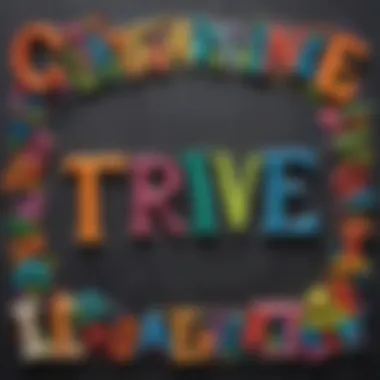Harnessing 'T' Words for Children's Growth and Resilience


Intro
In the maze of education, every word has the power to shape thoughts, ignite resilience, and foster growth in the minds of young learners. Among a plethora of linguistic tools, inspirational 'T' words stand out as particularly vibrant. These words, often carrying with them an essence of motivation, can transform a child’s outlook towards challenges and learning opportunities. This article aims to uncover the significance of these words in nurturing a growth mindset, especially for children.
Parents, educators, and guardians equipped with the right vocabulary can help children cultivate curiosity and creativity. The following sections will delve deep into the realm of interactive learning games, explore practical tips and tricks, and feature creative DIY projects. Each analysis is geared towards providing valuable insights into enhancing educational environments for children.
By pondering the meanings and implications of transformative words that begin with 'T', we can guide children through an inspiring educational journey where challenges become gateways to growth.
Understanding the Impact of Language
Language is not just a means of communication; it shapes our experiences, influences our thoughts, and can even dictate the way we view the world. This section focuses on understanding how impactful words, particularly inspirational vocabulary, are essential in fostering a growth mindset in children. Paying attention to the language we use can lead to significant changes in behavior and perspective.
The Role of Inspirational Vocabulary
When we introduce children to specific words that inspire, we essentially arm them with tools to approach challenges creatively and positively. Inspirational vocabulary does more than simply uplift; it resonates with individuals on an emotional level. Words like "trust," "tenacity," and "thrive" can serve as beacons during difficult times. They invite children to see beyond their current circumstances and imagine possibilities.
The way we talk to young minds has a direct correlation to their self-esteem and resilience. For instance, using words that emphasize encouragement can lead to increased confidence. These children may not only believe in themselves but also exhibit a heightened capacity to tackle life’s hurdles. Inspirational vocabulary often encourages expression and can help diminish feelings of isolation and self-doubt. It’s a chain reaction, igniting motivation and the will to persevere, even when the going gets tough.
"Words are, of course, the most powerful drug used by mankind." – Rudyard Kipling
Words as Tools for Motivation
Words hold immense power, acting as catalysts for action. In educational settings, the thoughtful use of vocabulary can transform how children approach learning. For example, when teachers use positive affirmations or encourage curiosity with words like "explore" or "discover," they effectively stimulate minds and promote a culture of inquiry and innovation.
Incorporating these "T" words into daily conversations, reaffirming children’s capabilities and qualities, can be not only motivating but liberating. It allows them to navigate their inner landscape filled with self-doubt and fears.
To effectively harness the motivational prowess of words, consider the following strategies:
- Model the Language: Adults should regularly utilize motivational language in discussions with children.
- Create a Word Wall: Dedicate a space in the classroom or home where inspirational words can be displayed. This serves as a constant reminder.
- Incorporate into Activities: Use these words in creative projects or storytelling sessions to emphasize their importance.
- Reflect on Usage: Regularly engage children in discussions about how certain words make them feel and how they perceive their meanings.
The impact of language is profound, and by utilizing inspirational words, we can effectively sow seeds of motivation, resilience, and growth in children, setting the foundation for their future success.
Essential Inspirational 'T' Words
When we talk about the building blocks of motivation and personal growth, certain words stand out. Among these, those that start with the letter 'T' pack a powerful punch. These words are more than just vocabulary; they encapsulate the essence of what it means to develop character and foster a supportive environment, especially for children.
Utilizing inspirational words can inspire action, evoke emotions, and guide learning in meaningful ways. They serve as reminders not only for children but also for parents and educators that language has the ability to shape one's perspective and attitude. By focusing on simple yet impactful 'T' words, we can instill significant values and beliefs that may guide younger generations through life's complexities.
Trust: The Foundation of Relationships
In any relationship, whether it's between friends, family, or teammates, trust acts as the bedrock. It's not merely a concept but a feeling that sets the stage for genuine connection. When children learn the value of trust, they also learn the importance of reliability and transparency. It teaches them to believe in others and, equally importantly, in themselves.
"Trust is like a mirror. You can fix it if it’s broken, but you can still see the cracks in that motherf****er’s reflection.”
This quote emphasizes how easily trust can be damaged, but it also can be restored.
By modeling trustworthy behavior, adults can show children how trust is a two-way street. They can learn that being honest and dependable builds stronger ties with others. This process is essential for developing healthy friendships and teamwork, laying down a solid foundation for future interactions.
Tenacity: The Power of Perseverance
Tenacity is the grit that pushes individuals through challenges. It’s the resolve that keeps one going, even when the going gets tough. When children cultivate tenacity, they learn that obstacles are not walls but rather hurdles to overcome. This approach to challenges not only strengthens their character but also gives them a sense of pride in their efforts.
Teaching young ones to be tenacious involves encouraging them to tackle tasks that may seem intimidating. Whether it’s completing a difficult homework assignment or trying a new sport, sticking with it despite setbacks can define their future success.


Transform: Embracing Change
Change is a constant in life, and how we respond to it significantly impacts our journey. Teaching kids to transform challenges into opportunities can shift their perspective entirely. Instead of fearing change, they learn to embrace it, understanding that growth often comes from stepping outside their comfort zones.
By focusing on transformation, we can encourage children to view every experience—good or bad—as a chance to learn and evolve. It's about being adaptable; the world is continually shifting, and those who can flow with it are far more likely to thrive.
Thrive: Flourishing in Adversity
To thrive means to prosper, especially during tough times. When children learn to thrive in adversity, they develop resilience that prepares them for life’s various ups and downs. This skill is invaluable; it ensures they don’t just survive but also flourish under pressure.
Adults can play a crucial role here by creating a nurturing environment where children are encouraged to express their feelings and find constructive ways to confront challenges. Celebrating small victories during difficult times reinforces their capabilities and builds emotional intelligence.
Teamwork: Collaborating for Success
The essence of teamwork isn’t merely about working together; it’s about understanding that each individual brings unique strengths to the table. When children grasp the significance of teamwork, they learn how to collaborate effectively, appreciating others’ viewpoints while also highlighting their contributions.
Moreover, this understanding encourages mutual respect and builds community. Children who learn the importance of teamwork are often better prepared for various social situations throughout their lives, be it in school activities or future workplaces.
Truth: The Value of Honesty
Honesty forms the backbone of personal integrity. Teaching children about truth underscores the importance of being straightforward, which is foundational for building trust and respect. While it may seem simpler sometimes to bend the truth, instilling the value of honesty encourages genuine relationships.
Being truthful isn't just about confessing mistakes; it’s about creating an environment where everyone feels safe to express themselves without fear of judgment. Children who embrace truth are often better equipped to navigate their social worlds, leading to deeper, more meaningful connections.
Talent: Recognizing Unique Strengths
Each child possesses unique talents that make them special. Identifying and nurturing these talents fosters self-esteem and encourages a sense of identity. It’s essential that children understand that every strength counts, whether it’s artistic, analytical, or interpersonal.
By recognizing individual talents, adults help children cultivate their interests and passions, providing them with opportunities to shine in areas that resonate with them. This self-discovery process is fundamental for building confidence and a strong sense of self-worth.
Tact: Navigating Difficult Conversations
Tact is the ability to communicate without offending others. Teaching children how to navigate challenging conversations with tact prepares them for future social situations. This skill is invaluable as it helps them articulate their thoughts and feelings while considering the feelings of others.
Practicing tact involves role-playing difficult scenarios, showing children how to express their opinions delicately. This approach not only fosters their communication skills but also teaches empathy, which is critical in forming cohesive relationships.
Through understanding these essential 'T' words, children are better prepared to step into the world with a toolkit of values and skills that can guide them through both challenges and triumphs.
Practical Applications for Educational Environments
In today’s rapidly changing world, the way we approach education can truly shape children’s futures. Recognizing the potential of inspirational words, especially those starting with 'T', is crucial for cultivating not just knowledge but also character. When we integrate these words into daily learning, we empower children with values that help them navigate life’s challenges. Practical applications in educational environments not only support academic growth but also encourage emotional and social development. This dual advantage makes it an invaluable area of focus for parents, educators, and caregivers alike.
Integrating 'T' Words into Daily Learning
Integrating 'T' words into the curriculum is a simple yet powerful strategy. Words like trust, tenacity, and transform become part of classroom discussions, enhancing the learning experience. For instance, a teacher might start every day with a brief reflection on what trust means in group projects. This sets the tone for collaboration and builds a classroom atmosphere rooted in respect and understanding.
- Daily Vocabulary Rotation: Select a 'T' word each week, allowing students to explore its meaning, usage, and impact.
- Reflection Journals: Encourage students to write how they can apply these words in their daily lives, promoting introspection.
In essence, the more 'T' words are woven into educational contexts, the more students connect with these concepts, laying the groundwork for a growth mindset.
Creating Learning Activities Focused on Inspirational Words


Activities geared towards 'T' words should encourage creativity and critical thinking. These activities provide students the chance to not only learn but also to apply what they’ve gained in real-world scenarios. For example, a role-play session centered on teamwork can help students understand how different contributions lead to a single goal.
Some engaging ideas include:
- Group Projects: Assign students to work on projects that require trust and teamwork, emphasizing how these values can create better outcomes.
- Creative Art Projects: Let students illustrate their interpretations of tenacity or transformation. This artistic avenue allows a deeper expression of understanding.
When learning becomes intertwined with real-life applications, it promotes resilience and the ability to tackle challenges effectively.
Encouraging Open Discussions about Values
Open discussions about values connected to 'T' words foster a supportive classroom environment. Each student comes with a unique background and perspective, which can ignite insightful conversations. By encouraging young learners to share their thoughts, educators pave the way for emotional growth and understanding.
Consider the following:
- Value Circles: Create a safe space for students to express their views on honesty, teamwork, and other critical values, allowing them to learn from each other.
- Debate Sessions: Introduce healthy debates on how tenacity is essential in various fields, such as sports, academics, or relationships. This cultivates critical thinking while allowing students to articulate their positions.
“In discussions, we often find that learning from each other is just as vital as traditional teaching methods.”
By fostering these conversations, parents and teachers can help children see the importance of values which will ultimately support their development into thoughtful, resilient individuals.
Cultivating a Growth Mindset
A growth mindset is about believing that intelligence and abilities can be developed through effort, experience, and learning from mistakes. This idea is not just a catchy phrase; it has real implications for educating children and shaping their futures. When we think about cultivating a growth mindset, we’re essentially talking about empowering young learners to embrace challenges rather than shy away from them.
Teaching Resilience through Inspirational Language
Language is the vehicle through which we communicate our thoughts and feelings. Using inspirational language can greatly help in building resilience among children. Resilience is the ability to bounce back from setbacks, to find strength when faced with difficulties. By teaching kids to articulate their feelings and frustrations through positive words, we provide them with tools to navigate life’s ups and downs.
Emphasizing phrases like "I can learn from this" or "Challenges help me grow" can shift a child’s perspective from a defeatist attitude to an empowering mindset.
- Model phrases that reinforce resilience:
- "Every mistake is a lesson."
- "It's okay to struggle; it means you are trying."
When children encounter a challenge, instead of panicking or feeling overwhelmed, they can learn to pause and reflect, saying to themselves, "What can I learn here?" This shift in language not only bolsters their capacity for resilience but also fosters a habit of self-reflection that is invaluable later in life.
Modeling Positive Behavior
Children often take cues from the adults around them. Therefore, modeling positive behavior is crucial in cultivating a growth mindset. It’s about demonstrating how to react to challenges and failures. If a parent or teacher shows a calm approach when things go awry, children are likely to mimic that response.
Consider these practical ways to model positive behavior:
- Demonstrate persistence: When faced with a difficult task, openly verbalize your struggle and how you will keep trying.
- Share experiences: Talk about times in your life when you faced setbacks and how you overcame them so that children can see that everyone faces challenges.
"Your actions speak louder than your words. Teach your children that it’s more about how we respond to challenges than avoiding them altogether."
By crafting a home or learning environment where open dialogue around challenges and solutions is welcomed, children not only learn to accept their limitations but also understand that success is often a process rather than an end goal. This creates a rich ground for personal growth and a robust mindset capable of embracing life's unpredictability.
The Impact on Children’s Development
Understanding the footprint of inspirational words on children's development is critical to nurturing their full potential. Such words don’t just act as mere expressions; they forge paths for emotional resilience, essential thinking skills, and robust community ties. By integrating words that resonate with positivity and encouragement into daily conversations, educators and caregivers can catalyze significant growth. This segment delves into how this impact manifests across various core areas of children's lives.


Fostering Emotional Intelligence
Emotional intelligence encompasses the ability to understand, manage, and express one’s emotions as well as those of others. Fostering this skillset in children can lead to greater empathy, stronger relationships, and improved mental health. One way to do this is through the use of inspirational terms that evoke feelings of trust and support.
When children are encouraged to articulate their emotions using words, they develop the vocabulary necessary to express complex feelings. Imagine a child who can describe their disappointment with the term frustration instead of simply saying they are sad. This additional layer of vocabulary allows for deeper conversations about feelings, leading to increased understanding and emotional maturity.
Some key benefits include:
- Improved relationships: Emotional awareness leads to better communication and deeper connections with peers and adults.
- Enhanced coping strategies: With robust emotional vocabulary, children are equipped to deal with challenges more effectively.
- Better conflict resolution: When children can articulate how they feel, it can lead to more constructive conversations rather than emotional outbursts.
Enhancing Critical Thinking and Problem Solving
Inspiration isn’t solely sentimental. It's a powerful stimulant for cognitive abilities, and it plays a pivotal role in developing critical thinking and problem-solving skills. When children encounter new challenges, inspirational words encourage them to think outside the box. Words like creativity and innovation prompt children to explore multiple solutions to a single problem.
Introducing terms that relate to strategic approaches can have a lasting effect. When faced with an obstacle, if they're thinking in terms of strategy and planning, they become more adept at removing the emotional weight from problem solving. This leads to:
- Diverse problem-solving skills: Exposure to different perspectives enables children to tackle problems from various angles.
- Increased confidence: As they learn to make decisions based on thoughtful consideration, kids grow self-assured in their abilities.
- Collaboration: Critical thinking often flourishes in group settings, where children can share and bounce ideas off each other, making teamwork essential.
Building Supportive Communities
A thriving community is grounded in strong relationships, mutual respect, and shared values. Utilizing inspirational words can help forge these connections among children, their peers, families, and teachers. Terms like support, belonging, and collaboration emphasize the importance of creating networks of mutual aid.
Communities can take many forms—school classrooms, neighborhood playgroups, or online forums. Each community can benefit from a language that reinforces positive interaction:
- Shared values: Using common inspirational words can align community members towards collective goals and mutual respect.
- Open communication: A focus on listening and understanding cultivates safe spaces where individuals feel valued.
- Empowerment: When children understand their roles in a community and feel supported, they are more likely to contribute actively.
The End: The Legacy of Inspirational Words
The journey of understanding and utilizing inspirational words doesn't merely conclude with an exploration of their meanings; instead, it creates a lasting impact that ripples through individual lives and communities. The emphasis on words—especially those beginning with 'T'—illustrates how language can serve as a bridge to personal growth and transformation. Creating a culture that values these words enables not just individuals, but also generations to thrive in an increasingly complex world.
By integrating words like Trust, Tenacity, and Teamwork into daily communication, we embolden children to fortify their emotional landscapes. These words act as lodestars, guiding young minds toward resilience and curiosity, fostering habits that encourage lifelong growth. Language is not passive; it is an active force that shapes behavior, perception, and ultimately, destiny.
"The words we choose can empower us and those around us. They create a legacy that influences the path forward."
As we consider the landscape of education and parenting, the legacy of inspirational words stands out for several reasons:
- Cultivation of Values: Children exposed to positive language grow into adults who embody those values, developing integrity, confidence, and empathy.
- Enhanced Communication: Familiarity with inspirational vocabulary equips learners with tools to express complex emotions and thoughts, heightening their critical thinking and problem-solving skills.
- Community Building: When a group collectively embraces these words, the result is a supportive environment where individuals feel valued and understood, paving the way for collaborative success.
The benefits of making inspirational words a focal point in educational settings aren't just immediate but resonate throughout one's life. Children who learn to appreciate and practice using uplifting language often carry that forward, making it a part of their daily interactions. This lays the groundwork for nurturing future generations who will advocate for kindness and growth.
Encouraging Lifelong Learning
Encouraging lifelong learning isn’t just about academic excellence; it’s tied deeply to how children perceive the world around them. When individuals grow up hearing inspirational words and engaging with them meaningfully, they learn to view every experience—good or bad—as a stepping-stone for development. This approach fosters a growth mindset, where challenges are seen as opportunities rather than obstacles.
To boost this mission, educators and parents can:
- Initiate discussions around inspirational words during family meals or classroom circles.
- Read literature that highlights determination, courage, and other traits linked to 'T' words.
- Create challenges that require kids to apply these words in real-world scenarios, enhancing both understanding and application.
When educational frameworks emphasize curiosity and exploration, children are more likely to internalize these concepts, transforming formal learning into a lifelong pursuit.
Inspiring Future Generations
Inspiration is contagious, and the words we choose to emphasize in our conversations today will mold the leaders of tomorrow. By showcasing words like Transform and Thrive, parents and educators can ignite a spark that impacts future generations. It's about more than just the meaning of the words; it’s about living them out.
By imparting an understanding of how these words translate to action, we encourage children to:
- Be proactive in their own learning journey.
- Offer support and encouragement to their peers.
- Foster an environment where innovation and creativity are celebrated.
Thus, the legacy of inspirational words is multi-faceted. It entails reshaping children's perceptions, boosting their aspirations, and encouraging them to cultivate their own strengths while uplifting others. In the end, we are not just sculptors of knowledge but gardeners of potential, using the rich soil of language to nurture the minds of the future.















